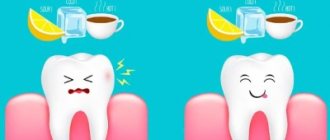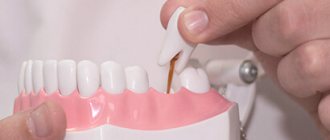If you take care of your teeth, they will always have an attractive appearance. If the teeth are healthy, then they allow their owner to bite and chew food without pain. Only teeth that a person takes care of will always allow him to be in comfort. Therefore, people consistently brush their teeth and visit dentists. However, no matter how high-quality dental care is carried out, at one moment a person may feel severe pain if he eats a cold or hot dish. If this happens, then there is a possibility that the teeth suffer from hyperesthesia - high sensitivity to external factors. The reason may be the destruction of the enamel. If pain occurs from sudden temperature changes, then this indicates 1 degree of hyperesthesia. You need to visit a dental clinic as soon as possible before the problem gets worse. The dentist will quickly find the causes of the problem, and then eliminate these causes.
What is hyperesthesia?
Hyperesthesia is an extreme sensitivity to external stimuli, such as sudden temperature changes, chemical exposure or ordinary touch. Such irritating factors can lead to short-term but severe pain. At the first stage, the teeth react to the temperature of the food, but later pain also arises from simply touching the tongue or exposure to certain substances. There is short-term pain that goes away quickly. Sometimes it doesn’t go away until 10-30 seconds.
If the tooth structure is so damaged that the nerve endings are exposed, then the person will experience pain from simply touching the area with a tongue or finger. Tooth enamel is the most durable tissue in the human body. It allows you to protect dentin from any external irritants. If the enamel is damaged, then any external factors will cause severe discomfort. If the dentin seal is broken, even the lightest touch will cause severe pain.
Special studies have been conducted that have shown that every third person suffers from hyperesthesia in the modern world, regardless of their location, social status or lifestyle. However, statistics have shown that women are more likely to suffer from this disease than the male population.
Consultation with a dentist
When the first signs of sensitivity appear, you should immediately make an appointment with the dentist. The doctor will determine the cause, prescribe appropriate therapy and advise on oral care issues. The main thing is not to let the disease progress. Timely treated caries will not lead to complications. Detailed information can be found here: treatment of initial caries.
In addition to therapy, the dentist prescribes medications and prescribes procedures. Oral hygiene and high-quality balanced nutrition are of great importance. The first-priority procedure that is performed on a patient with a high degree of sensitivity of units is the removal of solid deposits. Ultrasonic cleaning has performed well in this regard. It also strengthens the soft gum tissue.
Using a special paste, the teeth are covered with a thin film, which protects them from the external aggressive environment. Today, the device is actively used for gum massage. This is an irrigation device where rubber bristles are used instead of classic bristles. It also washes away food residues with a stream of water. Vitamin complexes are prescribed to strengthen the immune system, which accelerates the healing of inflamed areas and strengthens the tissues of the oral cavity. Follow the link Dental treatment in St. Petersburg and sign up at the ARTE-S clinic. The sooner the problem is identified, the easier and cheaper the therapy will be!
How to protect teeth from hyperesthesia?
Many people believe that it is enough to brush their teeth twice or thrice a day, and they will always be fine. However, this is a common misconception! If you brush your teeth incorrectly, they will not only not become stronger, but, on the contrary, they can be seriously harmed. For example, a high abrasive content in toothpaste will cause the enamel to become thinner.
The best solution would be to buy a fluoride-containing paste that has a medium level of abrasiveness. During the research, it was possible to identify why this disease occurs less often in men. The fact is that due to stress, the functioning of the gastrointestinal tract is seriously deteriorated. Because of this, the acidity of the oral cavity changes. Due to frequent exposure to acid, they become highly sensitive to irritants, which results in severe pain that causes a lot of discomfort.
To avoid hyperesthesia, you need to brush your teeth every day and try as much as possible to protect yourself from stress.
Medication treatment at home
Dentists consider the use of special gels, rinses, and toothpastes with or without very mild abrasives to be effective treatment at home.
When treating hypersensitivity, potassium nitrate is recognized as the most effective remedy. The therapeutic effect when using hygiene products that contain it occurs as a result of the penetration of potassium ions into the dentinal tubules, where they accumulate, surround the nerves in the pulp areas of the tubules and block their activity, thereby reducing the excitability of the nerve endings.
To achieve the effect, it is recommended to maintain a high concentration of potassium nitrate on the surface of the causative tooth or group of teeth. Potassium nitrate can be used as a solution, gel, paste, or other oral hygiene products.
When using toothpastes containing potassium nitrate or chloride and sodium monofluorophosphate, as when using potassium nitrate alone, hypersensitivity to tactile stimuli and cold air is reduced.
If, after two weeks of daily use in the morning and evening, the therapeutic effect of brushing teeth and applying products containing the substance is not observed, then the patient is recommended to wear mouth guards. They are filled with the same compositions and worn at night. Symptoms of hyperesthesia disappear after two weeks.
Also, positive dynamics in home therapy for hypersensitivity are shown by hygiene products that contain fluorides, strontium salts (chloride or acetate), calcium glycerophosphate or hydroxyapatite.
Sources used in writing the article:
- “Modern aspects of pain and local anesthesia in dentistry” (2003), Duiseeva G. Sh., Ruzuddinov S. R.
- “Dentistry: a textbook for universities” (2008), ed. N.N. Bazhanova.
- "Occlusion and Clinical Practice" (2008), Jaeger Klinenberg
Please rate this article
Stanislav Mezheritsky
Chief physician, surgeon, orthopedist
The author of the article is Stanislav Mezheritsky, a practicing dentist with 19 years of experience, chief physician and one of the founders of the Matisse Dent clinic. The main focus is orthopedic and surgical dentistry. Author of numerous publications, regular participant in specialized seminars.
Toothache caused by hot and cold foods
If your teeth respond with a painful reaction when eating such dishes, this means that the problem lies in the enamel of the teeth. When the enamel is healthy, the tooth structure is reliably protected from sudden temperature changes. If your teeth respond with pain when you eat, you should immediately visit a dentist to identify the cause. Here are a few reasons that cause such pain:
- Tissue inflammation has occurred;
- The structure in the enamel is damaged;
- Non-carious lesions;
- Cracks have appeared;
- Due to severe stress, the enamel has become thinner.
By the way, it happens that such pains are caused by the endocrine system or they may be caused by a stomach disease. It is necessary to reconsider your eating habits. It is necessary to reduce the consumption of foods with too high and low temperatures, and also be careful when drinking sour juices. To do this, you should use a straw.
Diagnosis of the disease
The main diagnostic criterion for pathology is the presence or absence of hyperesthesia in the area of non-carious lesions. Most often, increased sensitivity occurs against the background of wedge-shaped defects in the cervical region. In this case, upon careful examination, an apparently healthy tooth turns out to be affected by erosion; necrosis, enamel chipping, and premature abrasion are also detected.
At the Atlantis Dental clinic, to obtain a complete clinical picture of the causes of hyperesthesia, they are guided by a complete examination algorithm:
- detection of enamel microcracks using optical systems, which allows diagnosing clinical changes in hard tissues at an early stage;
- the reaction to chemical stimuli is determined by probing with a solution of glucose, hydrochloric and citric acid;
- thermal diagnostics (test for hot and cold) is carried out by irrigation using a syringe or an air stream in different directions;
- To identify demineralized areas, clinic doctors use a low-power laser.
As a result of diagnostic measures, the severity, prevalence and localization of hyperesthesia are revealed.
The appointment includes consultation and drawing up a treatment plan with cost determination
sign up for a free consultation
Not ready for an in-person consultation with a doctor? Ask your question by phone
Hyperesthesia after visiting the dentist
You should only visit reliable dental clinics. If the doctor does not have the proper skills and professionalism, then hyperesthesia may occur due to his actions. Most often the disease appears due to the following procedures:
- Cleaning and whitening of the dental cavity;
- Filling with photopolymerization procedure;
- Acid etching.
After any bleaching, special enamel protection must be carried out. If, after teeth whitening, pain is felt when eating foods with high and low temperatures, this means that the procedure was not carried out or was not performed as it should.
After the operation, the filled tooth became very sensitive to food with high and low temperatures, this may mean:
- Some inflamed tissue was never eliminated;
- Tissue inflammation has occurred;
- The doctor did not follow the technology, so the integrity of the seal was damaged during the installation process;
- The filling material irritates the tissue due to individual intolerance;
- There is an air bubble under the filling.
Unfortunately, in almost all of the above cases, the pain will not go away, but will get worse. When the pulp overheats, pulpitis can develop, which will lead to damage to other tissues. If your teeth react strongly to temperature changes for a long time, then you need to solve this problem as soon as possible.
As for tooth depulpation, it is normal if after the procedure the tooth reacts sharply to cold and hot food. If after some time the pain still remains, then you need to go to the dental clinic, because there is a possibility that the tooth was not fully treated.
Why do teeth react to heat?
Women face the problem twice as often as men, which is explained by unstable hormonal levels and high emotionality. Stress affects the functioning of the gastrointestinal tract, which entails disruption of metabolic processes and changes in the acidity of saliva. High sensitivity of teeth to hot and other irritants may be associated with age-related changes in the body, chronic diseases of the endocrine and nervous systems. In addition, among the main reasons are:
- abrasion of dentin;
- hypoplasia and demineralization of enamel;
- abuse of home teeth whitening products;
- extensive carious processes;
- avitaminosis;
- diseases of periodontal tissues of dystrophic and inflammatory origin.
Very often, high sensitivity to hot, cold and sour is caused by improper use of dental floss and aggressive brushing of teeth with a hard brush. At risk are patients who resort to frequent professional whitening and those with extensive carious lesions. The cause of hyperesthesia can be anomalies of the frenulum, incorrectly manufactured and installed orthodontic structures.
How to avoid hyperesthesia
To avoid hyperesthesia, you need to regularly take care of your tooth enamel. Here are a few simple rules that will help keep your enamel healthy:
- Brush your teeth every day with fluoride toothpaste. But you should avoid pastes that contain abrasives;
- To brush your teeth, you should choose a brush with medium hardness. You need to brush your teeth thoroughly, but without being too harsh;
- Be sure to eat foods that contain calcium and phosphorus. But you need to eat less sweets;
- Avoid eating very hot or cold foods. If you drink a hot drink, you should avoid getting it on your teeth.
If you have toothaches, you need to visit a qualified dentist so that he can find out the causes and then eliminate them. If everything is fine with your teeth, you should still go to the dental clinic once every six months for preventative care. If your teeth are in order, then going to the dental clinic will be a simple, pleasant walk.
Treatment methods for tooth sensitivity
For treatment, medications, combination therapy, complex therapy and physical methods are used.
Algorithm of the doctor’s actions in the treatment of dentin sensitivity:
- decreased excitability of the neuroreceptor apparatus of the dental pulp;
- decreased dentin permeability;
- blocking the entrances and obstructing the lumens of the dentinal tubules;
- mineralization of hard tooth tissue.
Based on the clinical picture, complex therapy may be prescribed, including obturation of the lumens of the dentinal tubules and electrophoresis with sodium fluoride solutions. The entrances of the tubules are closed with resin-containing or salt-containing desensitizers.
Laser therapy, a procedure for reducing pores using remineralizing gels, restoring gums in case of receding gums, filling teeth in places where the protective layer is thinning, and coating the enamel with fluoride varnish can also be used.
At home, the patient is recommended to use pastes containing strontium chloride, potassium nitrate, and sodium citrate for hygienic care.











